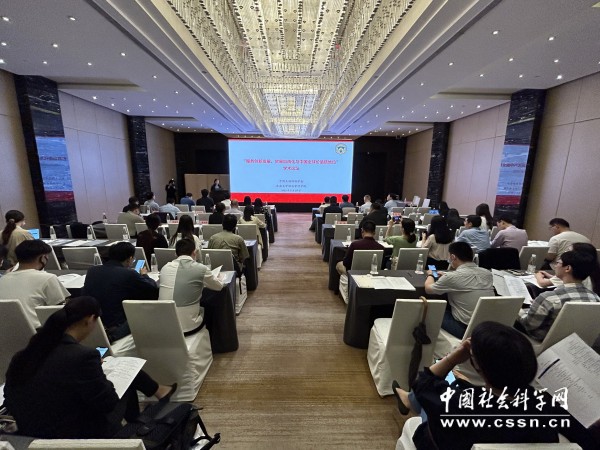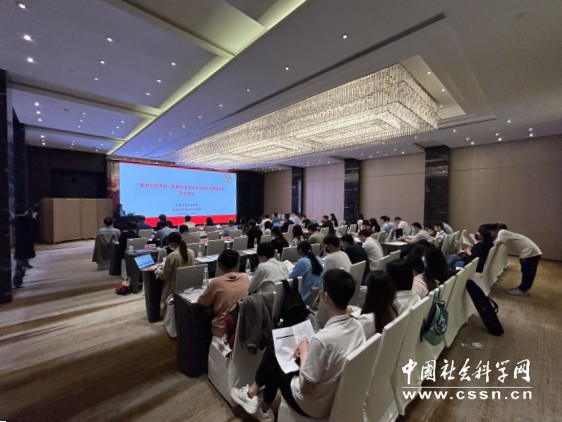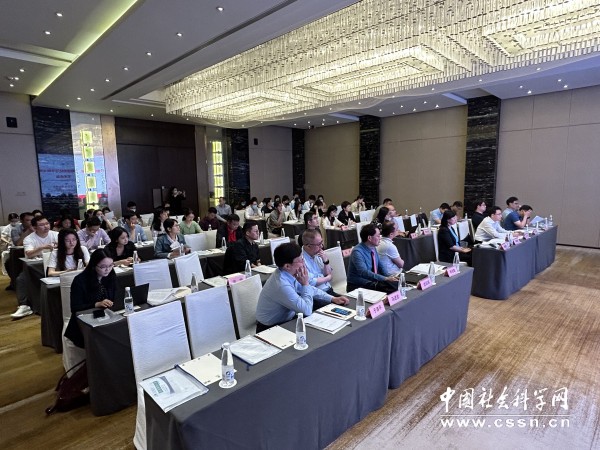An academic forum titled "Innovation Development of Service Industry, Trade Liberalization and China's Position in Global Value Chain" was held in Nanjing on May 27th. The forum was jointly hosted by the American Economic Association of China and the School of Economics and Management of Southeast University. It was undertaken by the Institute of International Economics of Southeast University, Jiangsu Center for Research on Globalization of Economy, and the Department of International Economics and Trade of Southeast University. Nearly a hundred faculty members and students from universities across China as well as some entrepreneurial alumni participated in this academic forum.

The forum was chaired by Director Qiu Bin of the Institute of International Economics of Southeast University. At the opening ceremony, Party Secretary Yuan Jianhong of the School of Economics and Management of Southeast University, Deputy Editor-in-Chief Feng Xiaoming of China & World Economy, Secretary-General Yu Zhen of the American Economic Association of China and Vice Dean of the School of Economics and Management of Wuhan University, as well as Deputy Director Tan Yong of Commerce Bureau of Nanjing delivered speeches.
Party Secretary Yuan Jianhong of the School of Economics and Management of Southeast University introduced that in recent years, the school has focused on disciplinary constructionand added a first-level Ph.D. program in digital economy and management in 2022. Many scholars' speeches at this forum will focus on academic research related to digital transformation, which is believed to provide useful guidance for the school's disciplinary construction.
Deputy Editor-in-Chief Feng Xiaoming of China & World Economy noted that this year marks the 30th anniversary of the founding of China & World Economy.Leveraging China's rapid economic development, China & World Economy have developed steadily with small but frequent steps. However, international academic journals need to go through a long development process. He hoped that scholars and academic leaders could jointly take care of this first Chinese academic English journal in the field of economics.
Secretary-General Yu Zhen of the American Economic Association of China and Vice Dean of the School of Economics and Management of Wuhan University noted that the theme of this forum is far-reaching. China-US trade relations are extremely important, and many issues such as service trade, trade liberalization, and global value chains deserve in-depth discussion among scholars and entrepreneurs. He also expressed expectations for the insights that scholars will share at the forum.
Deputy Director Tan Yong of the Commerce Bureau of Nanjing introduced the experience of organizing Nanjing entrepreneurs to exchange and interact in Hong Kong. He noted that the world and China have undergone tremendous changes in the past three years amid the pandemic. The year 2023 is bound to be extraordinary. Our development, research, and communication have become normalized. At this time, studying innovation development of the service industry, trade liberalization and China's position in global value chains is most appropriate. He proposed that everyone is in the midst of huge changes. Through our efforts, we can become important variables driving China's reform and opening up. He hoped that we could not only achieve great progress in goods trade but also realize innovative development in logistics trade.
Thereafter, experts and scholars from top universities including Tsinghua University, Fudan University, Zhejiang University, Nanjing University, Beijing Normal University, and Shanghai University of Finance and Economics conducted in-depth discussions around topics including "How to Manage Policy Expectations", "Digital Transformation, Technological Competition and Ascent in Global Value Chains", "Digital Trade and Reconstruction of Global Trade Rules" and "Liberalization of Service Trade, Position in Global Value Chains and China's International Circulation ".

Professor Lu Yi, Director of the Department of Economics of the School of Economics and Management at Tsinghua University, delivered a speech on "How to Manage Policy Expectations". In economics, managing expectations is very important. Almost all policy releases have expectations, and there is a time lag between policy publicity and implementation. So how far in advance should a policy be announced for it to be implemented appropriately? Taking China's vehicle purchase tax policy changes between 2015 and 2019 as an example, Professor Lu constructed an economic model to study the time characteristics of policy expectations and their implications for policy design. He noted that setting a 7-month policy expectation period seems appropriate for vehicle purchase tax. Their research is still ongoing as they will further explore how to grasp the length of policy expectations to optimize economic outcomes within a certain range.
Shen Guobing, Associate Dean of the Institute of World Economics and Politics at Fudan University, spoke about the new changes in Biden administration policies and his views on China-US economic and trade relations. He proposed that the trade structure of high-tech products between China and the US is highly complementary and interdependent. Given the complementarity and differences between the two major countries in labor and labor skills, production technology or labor productivity, natural resources, factor endowments, product categories, physical capital, demand diversity, and imperfect competition and economies of scale under scale returns, China and the US can gain much more through mutual trade than each building a complete industrial chain and supply chain independently. He suggested that China and the US should form a "competitive cooperation" relationship, abandon zero-sum thinking, consolidate common interests, act as bridge builders for global industrial and supply chains, and build a China-US relationship of mutual benefit and win-win.
Yu Jinping, Associate Dean of the School of Business of Nanjing University, pointed out that against the background of fierce digital technology competition among major countries around the world, only by improving the relative degree of digital transformation can the position in the value chain be improved. The wave of digital economic development is sweeping the world and becoming a key force reshaping the global economic structure, reorganizing global resource elements, and changing the global competitive landscape. The digital economy provides opportunities for SMEs to participate in international economic and trade activities and injects continuous vitality into the world economy. "Whether China can escape the plight of 'low-end embedding' in the global value chain through opportunities brought by digital transformation depends to a large extent on whether China can 'lead the world' in this technological competition," said Dean Yu. After considering the relative degree of digital transformation, he pointed out that the absolute level of digital transformation has little or even a negative impact on improving the position in the global value chain. The relative improvement of the digital transformation degree of enterprises has significantly promoted the upgrading of their position in the global value chain, and this effect is more significant for enterprises with higher digital element intensity. Industries with higher digital intensity upgrade their position in the global value chain faster than enterprises with lower digital investment. The impact of digital transformation's relative degree on the position in the global value chain is mainly achieved through the two mechanisms of relative total factor productivity and marginal returns. In addition, the relative increase of digital transformation is also conducive to optimizing enterprise resource allocation and thus promoting the ascent of its value chain position; digital trade barriers will significantly inhibit the promoting effect of digital transformation on the ascent of value chain position.

In his speech titled "Digital Trade and Reconstruction of Global Trade Rules", Director Ma Shuzhong of the Digital Trade Research Institute of Zhejiang University elaborated on the typical fact that global trade rules lag behind the development of digital trade and the opportunities and challenges of reconstructing global trade rules in the context of digital trade. He noted that although existing trade rules have covered some rule issues related to digital trade (such as trade facilitation), they cannot be fully applied to new digital trade scenarios and fail to meet the needs of digital trade development. Global trade rules have not introduced legal rules for new digital business models such as data flow, failing to meet the needs of digital trade development. Regarding the opportunities for reconstructing global trade rules, he proposed that digital trade development puts forward new requirements for laws and regulations of various countries. The key issues include cross-border data flow and data localization. For national security and development considerations, countries need to formulate domestic rules on the use of data elements to further stimulate the vitality of digital trade development.
Professor Cai Hongbo from the School of Economics and Business Administration at Beijing Normal University reported on recent research findings from his team on the topic of "Tax Incentives, Supply Chain Spillovers, and Digital Transformation". The research results showed that tax incentives for downstream enterprises significantly promoted the digital transformation of midstream enterprises. Downstream enterprises were able to transmit the effects of tax reductions to midstream enterprises through scale effects and cash flow effects, promoting the expansion of scale and optimization of cash flow of midstream enterprises, and further driving the digital transformation of midstream enterprises through mechanisms of digital investment and human capital. In contrast, tax incentives for upstream enterprises could only have a positive impact on their operational performance, without being able to spill over to midstream enterprises through the supply chain. Further analysis showed that the spillover effects of tax incentives for downstream enterprises were more significant for midstream enterprises with higher equity concentration, lower industry concentration, better regional technological environment, and weaker external financing constraints. He suggested that it is necessary to further improve the identification of targets for tax incentive policies - the choice of tax subjects should be appropriately tilted towards downstream industries and enterprises in the industrial and supply chains; continue to promote digital transformation and upgrading of enterprises, giving full play to the key role of digital economy and digital technologies; focus on the leading role of digital transformation of industrial chain backbone enterprises; ensure supply chain security, enhance supply chain synergies and ecology, and promote fair market competition.
In discussing research on the liberalization of service trade, position in global value chains, and China's international circulation, Director Qiu Bin from the International Economic Research Institute of Southeast University noted thatservice trade liberalization under RCEP could enhance China's position in global value chains across various industries. According to quantitative results, this process would lead to an average increase of 0.0028 and 0.0036 units respectively in the upstreamness of China's goods and service industries. However, the degree of change in upstreamness varies significantly across industries. The mechanism by which position in global value chains is improved lies in the fact that service trade liberalization affects nominal wages and intermediate goods prices in many countries, thereby causing changes in production costs and export prices of products in many industries, which will to some extent lead to a reshaping of international input-output linkages. In addition, regional service trade liberalization represented by RCEP will also enhance China's embeddedness in regional value chains and improve China's security in international circulation based on this.

The forum provided a platform for exchanges and collisions among experts and scholars and offered new ideas for further optimizing industries and trade in the new era and new situation. This forum has achieved a complete success.
(Source: China Social Science Net)
Translated by: Cui Xuerong
Reviewed by:Wei Liqing

